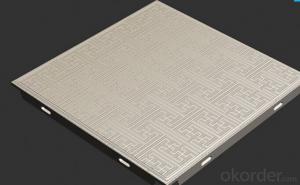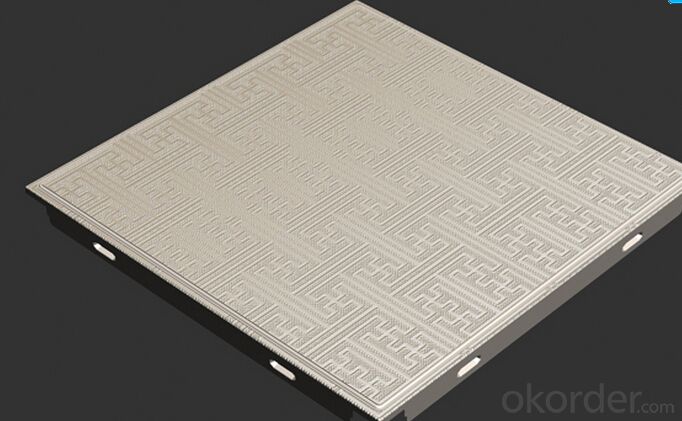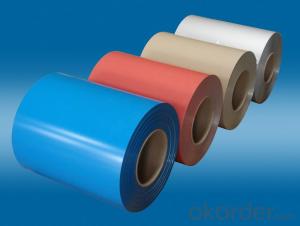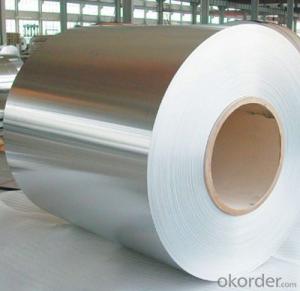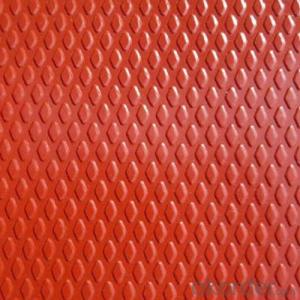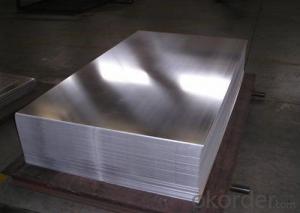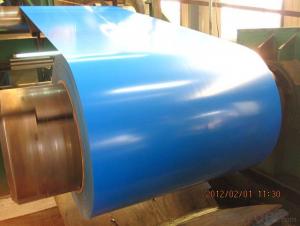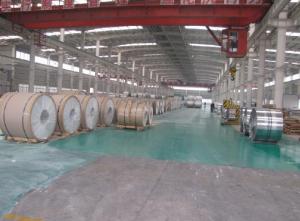En Aw-5052 Aluminum Coil for Indoor Ceiling
- Loading Port:
- Shanghai
- Payment Terms:
- TT OR LC
- Min Order Qty:
- 5 m.t.
- Supply Capability:
- 1000 m.t./month
OKorder Service Pledge
OKorder Financial Service
You Might Also Like
Specification
1. Structure of EN AW - 5052 Aluminium Sheet For Indoor Ceiling Description
EN AW - 5052 Aluminium Sheet For Indoor Ceiling is one semi-finished aluminium material. This sheet can be rolled down to aluminium coil,sheet,circle ect. The alloy AA1050 is widly used in building, industry ect. Its weight is much lower than steel. So many customers choosed aluminium material instead of steel.
2. Specification of EN AW - 5052 Aluminium Sheet For Indoor Ceiling
EN AW - 5052 Aluminium Sheet For Indoor Ceiling | |
Main Specification | |
Alloy | AA1xxx (AA1050, AA1060, AA1070, AA1100 etc.) |
AA3xxx (AA3003, AA3004, AA3005, AA3105 etc.) | |
AA5xxx, AA6XXX (AA5052,AA5083, AA5754, AA6061, AA6062 etc.) | |
AA8xxx(AA8011, AA8006 etc.) | |
Temper | H14,H16, H18, H22, H24, H26, H32,O/F, T4, T6, T651 |
Thickmess | 0.01mm-100mm |
Width | 30mm-1700mm |
Standard | GB/T 3880-2006/ASTM |
Special specification is available on customer's requirement | |
3. Application of EN AW - 5052 Aluminium Sheet For Indoor Ceiling
(1).Interior: wall cladding, ceilings, bathrooms, kitchens and balconies, shutters, doors...
(2).Exterior: wall cladding, facades, roofing, canopies, tunnels,column covers , renovations...
(3).Advertisement: display platforms, signboards, fascia, shop fronts...
4. Feature of EN AW - 5052 Aluminium Sheet For Indoor Ceiling
Surfact Quality :
Be free from Oil Stain, Dent, Inclusion, Scratches, Stain, Oxide Dicoloration, Breaks, Corrosion, Roll Marks, Dirt Streaks and other defect which will interfere with use,
Mechenical Property:
Chemical Composite and Mechanical Property
5. Certificate of EN AW - 5052 Aluminium Sheet For Indoor Ceiling
SGS and ROHS(if client request, paid by client), MTC(plant provided), Certificate of Origin(FORM A, FORM E, CO), Bureau Veritas and SGS (if client request, paid by client), CIQS certificate
6. Image of EN AW - 5052 Aluminium Sheet For Indoor Ceiling
7. Package and shipping of EN AW - 5052 Aluminium Sheet For Indoor Ceiling
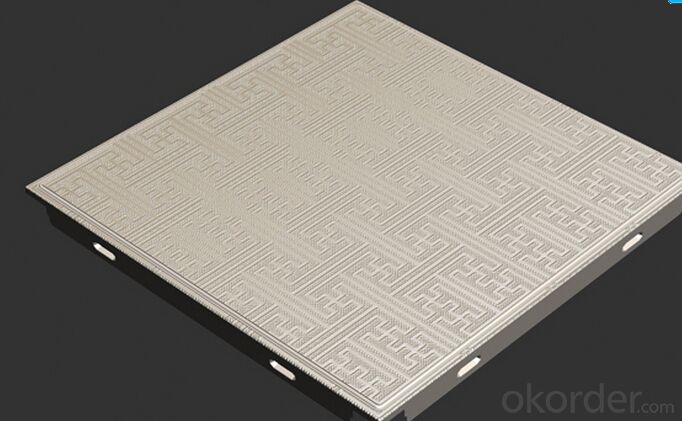
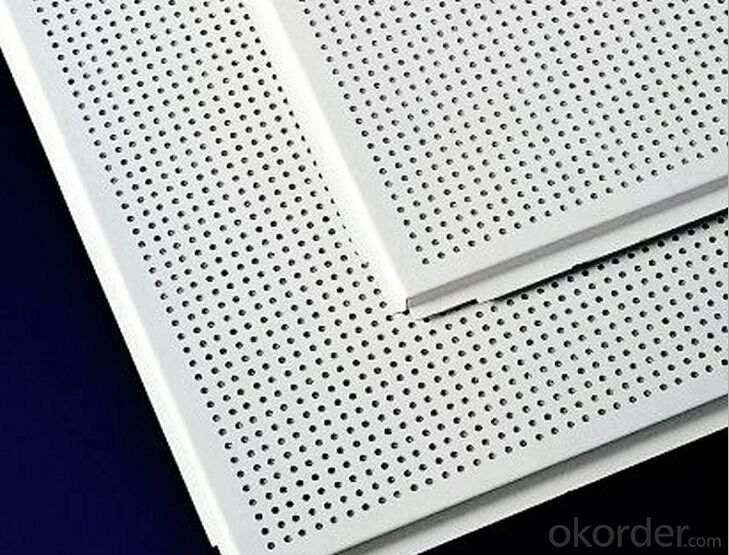
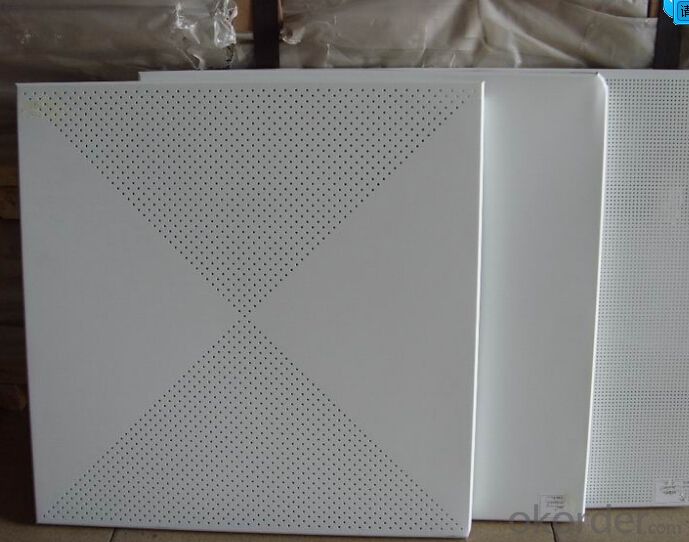
First, plastic cloth with drying agent inside; Second, Pearl Wool ; Third, wooden cases with dry agent , fumigation wooden pallets, aluminum surface could cover blue PVC film
8. FAQ
1) What is the delivery time?
Depends on actual order, around 20 to 35 days
2) What is the QC system:
We have QC staff of 20 persons and advanced equipment, each production is with MTC traced from Aluminum ingot lot.
3) What market do you mainly sell to?
Australia, America, Asia, Middle East, Western Europe, Africa etc
- Q: How are aluminum coils used in the production of electrical conductors?
- Due to their excellent electrical conductivity and lightweight properties, aluminum coils find wide application in the production of electrical conductors. Typically manufactured from high-grade aluminum alloy, these coils ensure optimal electrical performance. To achieve the desired shape and dimensions of the electrical conductor, the production process involves initially forming the aluminum coils into thin, flat strips. These strips then undergo further processing using techniques like rolling, annealing, and drawing. After processing and forming, a thin layer of insulating material, such as enamel or varnish, is applied to the aluminum coil. This coating serves to prevent electrical leakage, ensure proper insulation, and protect against corrosion and environmental factors. The high conductivity and efficient electrical current-carrying capacity of aluminum coils make them commonly used in the production of electrical conductors like wires and cables. They are particularly favored in industries where weight is a crucial consideration, such as aerospace and automotive. Moreover, aluminum coils offer cost advantages over alternative materials, making them a popular choice for electrical conductor production. Their lightweight nature also facilitates easier installation and handling, reducing labor costs and time. In conclusion, aluminum coils are essential in the production of electrical conductors, providing excellent electrical conductivity, lightweight properties, and cost advantages. Their versatility and efficiency make them the preferred choice in various industries where electrical conductivity is of utmost importance.
- Q: Can aluminum coils be used for heat transfer applications?
- Yes, aluminum coils can be used for heat transfer applications due to their excellent thermal conductivity properties.
- Q: when ferrous sulfate is poured into an aluminium can, holes appear in the can. Why?
- aluminum reacts via a redox reaction with iron(II): 3 Fe2+(aq) + 2 Al(s) --- 3 Fe(s) + 2 Al3+(aq)
- Q: Are aluminum coils suitable for marine environments?
- Aluminum coils are suitable for marine environments due to their excellent corrosion resistance properties. Aluminum has a natural oxide layer that forms on its surface, providing a protective barrier against saltwater corrosion. This makes aluminum coils highly resistant to rust and deterioration caused by exposure to marine conditions. Moreover, aluminum is lightweight, making it a preferred choice for marine applications where weight reduction is essential. Additionally, aluminum coils offer good thermal conductivity, which is beneficial for dissipating heat in marine cooling systems. Overall, aluminum coils are a reliable and durable choice for marine environments, ensuring long-lasting performance and minimal maintenance requirements.
- Q: What are the different coil coating options available for aluminum coils?
- There are several coil coating options available for aluminum coils, including polyester, polyurethane, acrylic, PVDF (Polyvinylidene Fluoride), and epoxy coatings. These coatings provide various levels of durability, corrosion resistance, color retention, and flexibility, making them suitable for different applications and environments.
- Q: What are the potential applications of perforated aluminum coils?
- Perforated aluminum coils have a wide range of potential applications. They can be used in architectural and construction projects for decorative purposes, such as facades, ceilings, and wall cladding. They are also commonly utilized in the automotive industry for grilles and ventilation systems. Additionally, perforated aluminum coils find application in the manufacturing of filters, screens, and acoustic panels due to their ability to efficiently control airflow and sound. The versatility of perforated aluminum coils makes them suitable for various industries, including aerospace, marine, and electronics, where lightweight and corrosion-resistant materials are required.
- Q: I'm asking about the aluminum tabs on soda cans. I've heard mixed things.
- Depends what you mean by site. A full service junkyard will pay by the pound for most kinds of metal, including washers dryers and stoves but you would need a lot of them to make it worthwhile at 60 cents a pound or so
- Q: Can aluminum coils be used in marine applications?
- Yes, aluminum coils can be used in marine applications. Aluminum is a corrosion-resistant metal that provides excellent durability and strength, making it suitable for various marine environments. It is commonly used in boat building, marine equipment, and other marine applications due to its lightweight nature and resistance to saltwater corrosion.
- Q: How do aluminum coils contribute to energy efficiency in buildings?
- Aluminum coils play a crucial role in enhancing energy efficiency in buildings. Firstly, aluminum is a highly conductive material, allowing for efficient heat transfer. This characteristic is essential in HVAC (Heating, Ventilation, and Air Conditioning) systems, where aluminum coils are commonly used. These coils facilitate the transfer of heat between the indoor and outdoor units, enabling effective temperature regulation and reducing energy consumption. Moreover, aluminum coils are lightweight, which makes them easier to handle and install. This not only saves time and labor costs but also reduces the overall weight of the HVAC system, leading to lower energy requirements for operation. Additionally, the lightweight nature of aluminum coils allows for the design of compact systems, saving valuable space in buildings. Furthermore, aluminum is highly resistant to corrosion, ensuring the longevity and durability of the coils. This resistance to corrosion is particularly crucial in areas with high humidity or exposure to harsh weather conditions. By maintaining their effectiveness over time, aluminum coils minimize the need for frequent replacements, reducing energy consumption associated with manufacturing and installation processes. Another significant benefit of aluminum coils is their recyclability. Aluminum is one of the most recycled materials globally, with a high recycling rate and minimal loss of quality during the process. By using aluminum coils, buildings contribute to a more sustainable and environmentally friendly approach, as the material can be recycled repeatedly without compromising its performance. Moreover, the recycling process requires significantly less energy compared to primary aluminum production, reducing greenhouse gas emissions. In conclusion, aluminum coils contribute to energy efficiency in buildings through their high conductivity, lightweight nature, corrosion resistance, and recyclability. By facilitating efficient heat transfer, reducing energy consumption, and promoting sustainability, aluminum coils play a vital role in enhancing the energy efficiency of HVAC systems and overall building performance.
- Q: Is it possible to utilize a grinder to smooth out or remove a damaged area on a steel coil?
- <p>Yes, you can use a grinder to grind down a damaged section of a steel coil. However, it's crucial to use the appropriate type of grinder designed for metalworking and to ensure safety precautions are taken, such as wearing protective gear. The grinder should be capable of handling the hardness of the steel and should be operated by someone experienced with such equipment. Always follow the manufacturer's guidelines and safety standards to prevent accidents and ensure the effectiveness of the grinding process.</p>
Send your message to us
En Aw-5052 Aluminum Coil for Indoor Ceiling
- Loading Port:
- Shanghai
- Payment Terms:
- TT OR LC
- Min Order Qty:
- 5 m.t.
- Supply Capability:
- 1000 m.t./month
OKorder Service Pledge
OKorder Financial Service
Similar products
Hot products
Hot Searches
Related keywords
